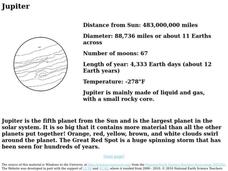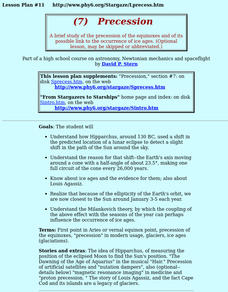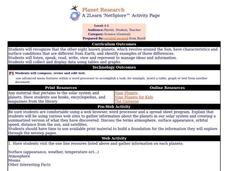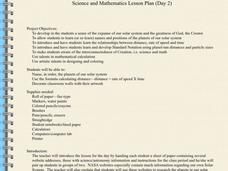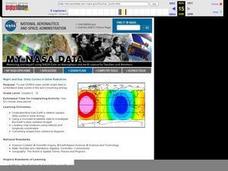Curated OER
Jupiter
In this solar system worksheet, 3rd graders read facts about Jupiter including its position from the sun, the length of its year, and number of moons. They read about its color, clouds, and Red Spot.
Curated OER
Precession
Learners explain how Hipparchus, around 130 BC, used a shift in the predicted location of a lunar eclipse to detect a slight shift in the path of the Sun around the sky. They examine the elliptical orbit in which the Earth travels around...
Curated OER
Planet Research
Pupils recognize that the other eight known planets, which revolve around the Sun, have characteristics and surface conditions that are different from Earth; and identify examples of those differences.
Curated OER
Friendship Mobiles
Students discuss how the sun, wind, clouds and other elements of nature can be their friends. They create mobile demonstrating this.
Curated OER
The Solar System
Young scholars research the characteristics of planets in our solar system. In this space science lesson, students create a solar system model with each planet arranged according to their distance from the sun. They solve problems using...
Curated OER
Animating Motion
Learners apply what they recall about objects in motion by animati ng sequences of pictures that model a set of physical conditions. They animate the orbital motions of the Earth, the space shuttle, and the Moon based on calculations of...
Curated OER
Sound Stretching
In this basic vowel and consonant blending lesson, young learners are shown how to "blend" the sounds of different letters together in order to make a word. Simple words such as, "sun," "moon," and, "ant," are used in a whole-class setting.
Curated OER
Sunrise/Sunset
Students apply data from a weather-related website to predict patterns in the sunrise and sunset.
Curated OER
Weather
Second graders, while examining the weather, describe the characteristics of the Sun, Stars and Earth's Moon (e.g relative size, shape, color, production of light, heat). Thus, the give examples of how the sun affects Earth's processes...
Curated OER
Planet Cards
In this science card worksheet, students cut out the different cards and study the planets Earth, Venus, Mercury, Saturn, Jupiter, Mars, Pluto, Neptune, and Uranus. Students' objective is to learn each planets' orbit, rotation, distance...
Curated OER
Brush Your Teeth - Recording Sheet
In this teeth brushing chart worksheet, students put a check mark in the squares under the days of the week each time they brush their teeth. They place the marks under the icon of the sun or the moon to indicate if they brushed their...
Indian Land Tenure Foundation
Tribal Origin Stories
The teacher reads and retells Californian tribal origin or creation stories that come from the traditions of a variety of California Indian tribes. Then, pupils get together in groups and retell the stories they just heard; just as...
Curated OER
What Time Is It? File Folder Game
Use a manila folder to make a clock game with these adorable time-related printables. The materials include an analog clock and a digital clock with all the related equipment, such as clock hands and numbers. Laminate or make the movable...
Curated OER
Space: The Final Frontier
Sixth graders construct a graph to demonstration information that they've learned about the solary system. They also write or illustrate a sonar or lunar eclipse.
Curated OER
Earth In Space Vocabulary Sheet
In this space science vocabulary worksheet, students read the definitions for 6 common terms. Students then look up 4 words and write the meanings. Students alphabetize the vocabulary words on another piece of paper.
Discovery Education
Solar System Scale
Extremely large or extremely small numbers are difficult to comprehend. To help understand the massive scale of the solar system, learners complete two activities. First, they create a model to compares the size of the bodies in the...
Curated OER
NIGHT AND DAY: DAILY CYCLES IN SOLAR RADIATION
Students examine how Earth's rotation causes daily cycles in solar energy using a microset of satellite data to investigate the Earth's daily radiation budget and locating map locations using latitude and longitude coordinates.
American Museum of Natural History
What is Astronomy?
Go study the universe. Pupils learn seven aspects about astronomy and astronomers. They begin to learn about constellations; distance and motion between objects; gravity; the electromagnetic spectrum; dark matter and energy; and teams of...
BBC
Sound and Hearing
First and second graders recognize that sound is generated in a variety of ways, and that it comes from many different sources. They explore tone and volume, realizing that there are different ways to describe sound. Some musical...
BBC
Light and Shadows
Light is such an amazing thing! Elementary schoolers explore the wonderful world of light and shadow. The lesson is meant to be carried out on a whiteboard. Objects are placed in front of a light source, and learners must predict what...
BBC
Ourselves
Young biologists identify parts of the body, sort humans from other animals, and list the difference they see. Learners are split up into groups of three, and each group must find pictures in magazines of humans and other animals. They...
Curated OER
Mythology Study Guide
After exploring the wonderful world of mythology, give your high schoolers this multiple choice quiz to assess their ability to recall pertinent information. There are 15 questions posed, and users can press "submit" to receive immediate...
Curated OER
Comparing Poems
Young literary analysts compare two poems by the same author. Readers look for slant rhyme, observe the beat and rhythm of each, and search for repeated vowel sounds. After re-reading, they observe the lack of punctuation and the stanza...
Denver Art Museum
Descriptive Haiku
Even though this is technically an art activity, haiku poetry is actually the main focus! Learners view photographs of Japanese tea caddies. They list five descriptive words for the caddies, then write haiku poems using the caddies as...
Other popular searches
- Earth Moon Sun System
- Earth Sun and Moon
- Earth/sun/moon
- Sun and Moon Observations
- Sun Moon Earth
- Earth, Sun and Moon
- Space, Sun and Moon
- Earth and Moon and Sun
- Sun Moon Stars
- Moon, Sun and Stars
